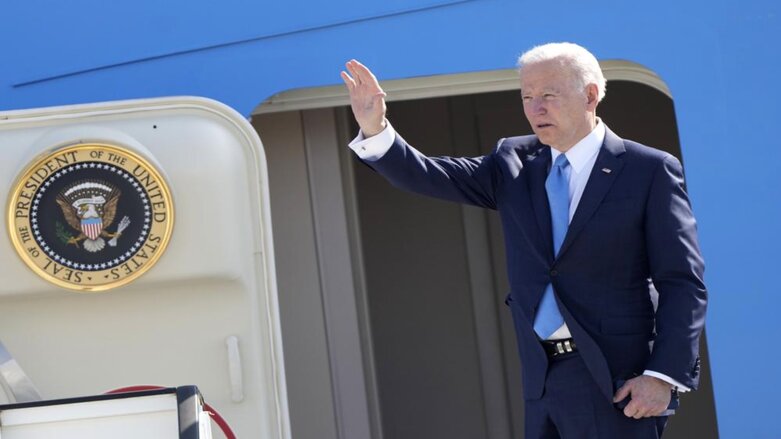US, NATO, G7, EU prepare for extended confrontation with Russia; Democracy itself at stake

WASHINGTON DC (Kurdistan 24) – Three summit meetings in Brussels on Thursday made clear that the US and its allies, including in NATO and the European Union (EU), as well as Japan, are preparing for a protracted confrontation with Russia over its assault on Ukraine.
Biden: Putin Seeks to Replace Liberal World Order with Autocratic Order
For US President Joe Biden, the fate of liberal democracies themselves hangs in the balance in the crisis over Ukraine. Speaking on Thursday, alongside Charles Michel, President of the European Council, Biden recounted what Russian President Vladimir Putin had told him when they met last year.
Notably, Biden's description of Putin's objectives is far more expansive than that expressed by most western analysts, who say that Putin seeks to re-establish a new Russian empire in the lands of the former Soviet Union.
That is a far-reaching goal, of course. But Biden described Putin's goal as much more: an existential challenge to the liberal world order that the US helped establish and led in the decades after World War II.
"One of the things that [Putin has] tried to do—his overwhelming objective," Biden said, speaking just before the EU summit began, "is to demonstrate that democracies cannot function in the 21st century."
"Things are moving so rapidly," Biden said, explaining what the Russian leader had told him, "they require consensus, and it's too difficult to get consensus." So "autocracies are going to rule," according to Putin.
So that is Putin's view. But he would not have expressed it to Biden alone. He would tell it to others, as well—particularly, his autocratic allies.
Putin and Chinese leader Xi Jin Ping met on Feb. 4, just before the Winter Olympics began in China—while Russian forces massed on Ukraine's borders, and the US warned, repeatedly, that Russia was about to invade.
In their Beijing summit, the Russian and Chinese leaders announced a strategic partnership that "has no limits." Almost certainly, Putin expressed to Xi the same view that he had shared with Biden: autocracies will prove superior.
But whereas Biden was appalled, Xi was, almost certainly, approving of Putin's perspective. And, almost certainly, as Russia's assault on Ukraine began, Chinese intelligence, like almost all intelligence services—Russian, as well as Western—expected Russian forces to achieve a quick victory.
That may well have been the underlying issue as the conflict in Ukraine began: a Russo-Sino challenge to the post-World War II liberal democratic order.
"A month ago, Biden's talk of making democracy prevail over autocracy seemed like a gauzy ideological sheen surrounding his plans to take on China," New York Times' correspondent, David Sanger, wrote.
"Today, as Biden got the [allied] leaders to endorse a new program to bolster other fragile democratic states worried that they will be in Putin's crosshairs next, it has a different meaning," Sanger concluded.
Need for Unity, Consensus on Key Goals among US Allies
On Thursday, speaking in Brussels, Biden explained that he had requested the summit meetings in order to "have absolute unity" among allied countries. As distinct from the Trump administration, securing such consensus is central to the Biden administration's approach to national security challenges.
Biden listed his three key goals for the summit meetings: 1) "support Ukraine with military and humanitarian assistance"; 2) "impose the most significant economic sanctions regime ever" to "cripple Putin's economy and punish him for his actions"; and 3) "fortify the eastern flank of our NATO allies," who are "very concerned" about what might happen next.
"We accomplished all three," Biden affirmed, and "we're determined to sustain those efforts and to build on them."
The allies' primary tools will be economic—sanctions, above all—and political. They will also continue to supply military equipment to Ukraine, even dispatching more lethal weapons systems. US officials, for example, have mentioned anti-ship missiles.
Biden made clear that these are not meant as temporary measures. "We're determined to sustain those efforts and to build on them," he said.
Among other points, the G7 and EU endorsed the US proposal to investigate potential war crimes committed by Russia in Ukraine.
Russian Response
Recent developments seem to have precipitated a two-pronged, somewhat contradictory Russian response.
On Friday, Moscow announced, in a somewhat conciliatory move, that it had completed "phase one" of what it calls its "special military operation" in Ukraine, and it would focus its efforts on that country's eastern regions.
The timing of the announcement from the Russian Defense Ministry suggests that it is a response both to Ukraine's unexpectedly strong resistance to Moscow's assault and the US-led diplomacy in Europe.
Yet Russian Foreign Minister Sergey Lavrov spoke with extreme bellicosity while apparently responding to the same events.
"Today, a genuine hybrid war, an 'all-out war' has been declared against us," Lavrov said, according to Russia's official state-run TASS news agency.
"This term"—i.e., all-out war—"which was exploited by Hitler's Germany, is now pronounced by many European politicians, when talking about what they want to do with Russia," Lavrov continued.
The Russian Foreign Minister was actually likening Europe and the US to Germany's Nazi regime under Adolph Hitler.
"The goals are not concealed," Lavrov said. "They are publicly announced, that is to destroy, devastate, ruin, and suffocate the Russian economy and Russia as a whole."
Thus, it remains to be seen how Moscow will respond to the situation that Lavrov denounced in such strong terms.
